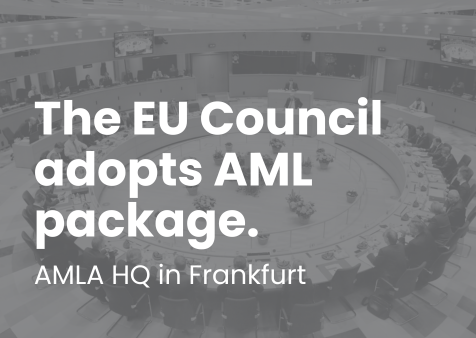Anti-Money Laundering: The Council of EU adopts the AML package.
AMLA HQ in Frankfurt
The adoption of the new anti-money-laundering (AML) rules aims to protect EU citizens and the EU’s financial system against money laundering and the financing of terrorism.
The new legislative package transfers all private sector anti-money laundering and counter-terrorism financing (AML/CFT) rules to a directly applicable regulation, while a directive will handle the organization of national authorities fighting these crimes.
The regulation uniformly harmonizes AML rules across the EU, closing fraud loopholes. It extends AML obligations to new entities, including most of the crypto sector, luxury goods traders, and football clubs/agents. It also imposes stricter due diligence, beneficial ownership regulations, and a €10k limit on cash payments.
The directive enhances national AML system organization, specifying clear cooperation rules for financial intelligence units (FIUs) and supervisors.
Additionally, the new legislative package establishes the European Authority for Anti-Money Laundering and Countering the Financing of Terrorism (AMLA), which will have direct and indirect supervisory powers over high-risk entities in the financial sector. AMLA aims to enhance the AML/CFT framework’s efficiency by integrating national supervisors and ensuring compliance. It will also support non-financial sectors and coordinate with financial intelligence units (FIUs).
AMLA can impose financial penalties for serious, systematic, or repeated breaches of AML/CFT requirements. The directive mandates EU member states to provide centralized bank account register information via a single access point for FIUs. A separate directive ensures national law enforcement authorities have access to these registers and harmonizes bank statement formats. This access is crucial for fighting crime and tracing criminal proceeds.
The new AML directive also prescribes that EU member states make information from centralised bank account registers – containing data on who has which bank account and where – available through a single access point.
This is the final step of the adoption procedure. The texts will now be published in the EU’s Official Journal and enter into force.
The AML regulation will apply three years after the entry into force. Member states will have two years to transpose some parts of the AML directive and three years for others.
AMLA will be based in Frankfurt and start operations in mid-2025.
Official source:
Council of the EU / Press release / 30 May 2024
Anti-money laundering: Council adopts package of rules
Click here to check out our related article: 24 Jan 2024.


